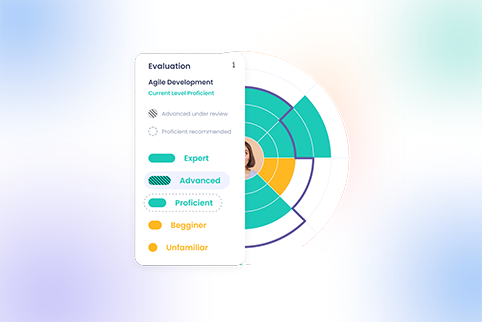Managing Gen Z: How to Empower Digital Natives for Maximum Impact
11 min read

Managing Gen Z is quickly becoming one of the top priorities for organizations, as they are the newest generation to join the professional realm, bringing a unique set of characteristics, values, and expectations.
This demands thoughtful consideration from managers and HR departments, who need to find the best ways of engaging and retaining Gen Z talent — all while maintaining a stable, productive, and harmonious work environment.
In this post, we explore the key strategies or actions that will empower managers and team leaders to harness the full potential of Gen Zers or Zoomers and promote a culture of collaboration and success. Let’s dive right in!
Understanding the defining traits of Gen Z
Before deciding how management styles and strategies should adapt to meet the needs of Gen Z, the first step any people or HR manager needs to take is to better understand what makes Gen Zers tick.
This will not only help organizations manage Gen Z employees better, but it will also represent the basis for training and retaining them in the long run. Some of the fundamental traits and values of this generation are:
- Gen Z are digital natives: they embrace emerging technologies and self-learning programs.
- Gen Z are inclusive and prioritize individual identity: they accept different lifestyles and ways of thinking and want to allow and be allowed to be themselves.
- Gen Z are very pragmatic: they are oriented toward getting things done and look for what works instead of idealistic solutions.
- Gen Z appreciate transparency: they expect transparent and authentic communication, (work) relationships, pay and benefits, etc.
- Gen Z are autonomous and flexible: they are more self-reliant when compared to other generations and expect to be allowed to work when, where, and how they choose.
- Gen Z are great collaborators and competitors: they thrive when given challenges that push them to grow and enjoy working together with their peers and other talented people.
- Gen Z prioritize work-life balance: they value stability in all aspects of life and are more aware of their mental health and stress levels.
- Gen Z seek meaning and fulfillment: they want to feel their contribution really makes a difference and tend to choose companies they can be proud of and whose mission they can support.
- Gen Z have a deep desire to grow: they want to progress in their careers fast and aren’t afraid to move from one company to another if that means having better chances of growing.
- Gen Z have an entrepreneurial spirit: inspired by online influencers, they are eager to take advantage of digital skills and online tools to transform their passions and side hustles into successful businesses.
Learn more about Gen Z characteristics and their impact on the workplace.
What is the best way to engage Gen Z?
As Silvia Enache, Head of Human Resources at Bringo points out: “We now find ourselves in a challenging mix with four generations, baby boomers, Gen X, Millennials, and Gen Z bringing different values, perceptions, and behaviors in the workspace.”
According to her, “On an organizational level, getting these cross-generational relationships right can influence and improve many aspects such as:
- Succession planning
- Team cohesion
- Increase engagement
- Reduce turnover
- Influence on knowledge transfer
- Boost performance overall”
Based on the considerations above, as an employer, you can take several steps to keep Gen Zers engaged in the workplace and motivate them to achieve the best results. Here are the most important initiatives worth considering:
1. Promote open communication
Managers and team leaders need to be flexible when it comes to communicating with Gen Zers. On one hand, they prefer instant messages and virtual meetings, which can go a long way, even in professional contexts.
On the other hand, studies have shown that they also seek face-to-face interactions, which are especially important in the manager-employee relationship, and play a crucial role in having honest, open, and heart-to-heart conversations. Finding the right balance between these two is the key here.
Another important aspect of communicating with Gen Z employees is clearly articulating and sharing the company’s mission and values. Since Gen Zers are driven by a sense of purpose and social causes, it’s essential to reach an alignment between organizational value and their aspirations.
2. Offer flexibility
Another effective way of managing Gen Z is to meet their aspiration for flexibility, which, in a professional environment, manifests as the possibility to decide when, where, and how they do their job. If fully remote work isn’t possible, you should at least embrace a hybrid environment to keep this generation motivated and happy.
Listening to their feedback on how things are done or how they could be improved is another method of showing that you value flexibility and are open to improving existing processes and workflows.
3. Provide workplace diversity, equity, and inclusion
Feeling safe to be themselves and express who they really are makes a huge difference for members of this generation, both in their professional and personal lives.
That’s why, to make the most out of Gen Zers in the workplace, you need to nurture a reliable community, one with which they can develop a real sense of connection and belonging.
Initiatives that will help to overcome stereotypes and celebrate diversity will make a huge difference in the life of Gen Z employees and will allow them to thrive and perform at their best.
4. Emphasize skills-based learning and opportunities for growth
By offering tailored training programs, mentorship or coaching opportunities, and career paths aligned with their skill set and career aspirations, companies will show a genuine commitment to the success of their Gen Z talent — which will have a direct impact on their overall satisfaction, engagement, and performance levels.
These initiatives will not only improve their skills but also extend the period of time Gen Zers will stay with your company. That’s because career development and personal growth are among the top factors that make them seek opportunities elsewhere. Gen Zers are longing for a chance to grow and develop in their jobs and they want it fast. This digital-native generation has lived in a world with instant experiences and they expect it too in their professional lives.
Career pathing is a powerful way to help these employees envision their future trajectory and how they can move from the current position to their ultimate career goal within your organization. However, these opportunities should remain flexible and allow each employee to follow their own interests as long as they’re aligned with business goals. This means embracing non-linear career paths and facilitating vertical, lateral, and cross-departmental moves.
5. Have regular check-ins and performance reviews
Due to Gen Z’s desire for frequent feedback, growth, and clear communication, it is essential for managers to embrace regular check-ins and performance evaluations. These interactions will support discussions about goals and progress, address any personal concerns, and make job expectations crystal clear.
Gen Zers will also see these reviews as opportunities to gain clarity on their contributions (and areas for improvement) and better align with the long-term goals of the organization.
Feedback from managers should be very specific and future-oriented, which means looking at the progress made over a certain period and establishing plans to further develop the hard and soft skills of this young generation.
6. Recognize and reward achievements
Recognition for accomplishments — big or small — is beneficial not only for managing Gen Z. However, managers should give it more importance in this context because Zoomers or post-millennials (as they are also called) are less patient compared to other generations and, therefore, much more likely to leave when their needs aren’t met or they feel treated unfairly.
Celebrating achievements is also proof that the company stands behind its values, and will not only inspire Gen Zers to extend their tenure but will also determine their peers to strive and become the next in line to be rewarded.
Recognition doesn’t always need to take the form of bonuses or extra benefits (although you cannot go wrong with that). It can be something as simple as going out and having dinner together with your team or enjoying a fun afternoon playing board games together — anything that shows a real appreciation for them and that you truly value human connection.
7. Explain how and why their work is meaningful
Another vital aspect of managing Gen Z is clarifying the meaningfulness and relevancy of their work. Managers should always keep in mind that this is a purpose-driven generation, which seeks jobs that align with their values.
When Gen Z employees understand the impact of their contributions, they become more committed and enthusiastic, which makes them approach work-related tasks from a place of intrinsic motivation.
Managers should communicate the “why” behind work on a regular basis, as it is an excellent way to inspire Gen Z employees to view their activities as meaningful and valuable and enable them to see the direct connection between their day-to-day tasks and the company’s mission.
8. Support their deep desire for work-life balance
Work-life balance is very high on Gen Z’s list of priorities, which is why organizations should find ways to enable and support it. What’s important is to have concrete initiatives in this direction, which clearly show that you care for the physical and mental well-being of your (Gen Z) employees.
Another trend that is picking up speed is the concept of the 4-day work week, which has seen encouraging results among the companies that have tested it — many even deciding not to return to the old ways of doing things. Still, this is only an example in this direction since this work model cannot be applied to all industries.
9. Adopt a human-centric approach
Another way of better managing Gen Z is embracing a human-centric approach, which will help create a supportive and empathetic work environment.
When managers and team leaders prioritize the holistic development and fulfillment of Gen Z employees, they not only maximize their potential but also create a culture where Gen Zers feel valued and understood. For example, human-centric leadership rooted in empathy, vulnerability, or authenticity has been constantly pointed out as the way forward. According to the Bersin Academy, this leadership style is rising in popularity since “all kinds of organizations begin to realize that supporting their people and nurturing a healthy culture isn’t a distraction from business goals––in fact, it’s deeply strategic.”
A human-centric strategy might bring you closer to the goal of creating multi-generational equilibrium in the workplace. This entails constructing workflows, norms, and workspaces around human needs, psychical, cognitive, and emotional, instead of forcing human behavior to conform to traditional processes or locations that constrain them.
— Silvia Enache, Head of Human Resources at Bringo
Bridging the generational gap
And last but definitely not least when it comes to effectively managing Gen Z is bridging the generational gap.
With multiple generations working side by side, each with distinct communication styles, work habits, and values, it takes a certain amount of effort and planning to create a harmonious environment. As Silvia Enache explains: “Bringing people together means embedding elements that reduce bias, as much as possible, determine what strengths each generation has and help them surface to the benefit of all categories of people.”
Knowledge sharing is one initiative in that direction. For instance, Gen Z employees can learn from their more experienced colleagues, and, at the same time, their own fresh ideas and tech-savviness can lead to innovations and new approaches regarding workflows.
Reducing personal biases is another step, and it can only happen by understanding and respecting the diverse perspectives of different generations in your workforce, which will prevent miscommunication or even conflicts in the long run.
This means creating programs and initiatives with this purpose in mind, such as facilitating mutual mentorship programs, creating space for inter-generational resource groups, adapting communication channels considering generational preferences, making sure you capture all styles, from the quick messaging habits of Gen Z to the more structured and planned style of the Millennials.
— Silvia Enache, Head of Human Resources at Bringo
Final thoughts
Effectively managing Gen Z in the workplace is all about adapting your approaches and embracing the unique qualities of these digital natives — all while encouraging and supporting collaboration across different generations.
As we navigate the ever-evolving landscape of work, embracing the strengths of Gen Zers while bridging generational gaps sets the stage for a dynamic, inclusive, and successful future for both employees and organizations alike.







